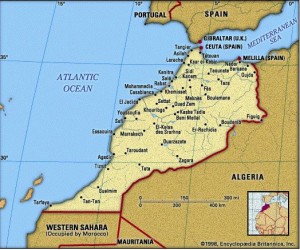Morocco
Morocco was known in ancient times as Maurusia and Mauretania and was mentioned by both Herodotus and Strabo. Herodotus referred to its inhabitants as Atalantes. It is the only African country with a coast on both the Atlantic and the Mediterranean. Its capital is Rabat and the largest city is Casablanca.
 The very early human occupation of Morocco was confirmed in 2007 when beads were discovered in a cave in Eastern Morocco dated to around 80000 BC. A few years earlier a prehistoric city, dated to 13000 BC, was discovered in Western Sahara controlled by Morocco(f).
The very early human occupation of Morocco was confirmed in 2007 when beads were discovered in a cave in Eastern Morocco dated to around 80000 BC. A few years earlier a prehistoric city, dated to 13000 BC, was discovered in Western Sahara controlled by Morocco(f).
This has now been overshadowed by a 2017 report(c) that the remains of early relatives of homo sapiens had been discovered in Morocco and dated to between 300,000 and 350,000 years ago.
The Mzora Stone Circle is a huge megalithic monument in Morocco and is reputed to be the largest stone ellipse in the world. However, there are many other megalithic monuments in the country and across the Maghreb generally. Over twenty years ago Natalya Marquand published a study of ‘Megaliths and Stone Circles of Morocco and Their Relation to Those of the Mediterranean and Europe’. In conclusion, she noted that “The relations between the megaliths of Morocco may not be directly related to those in the rest of North Africa, and may be related to those in Spain. We can never really be sure, but in some way, all the megaliths of the Euro-Mediterranean region are connected (and they even extend further, into sub-Saharan Africa) connecting people, beliefs and culture the whole region over.” >Marquand’s paper is available on the Internet Archive website(e).<
Morocco was suggested as the possible location of Atlantis as early as 1868 by D.A. Godron. A few years later E.F Berlioux and Gustave Lagneau, a French anthropologist adopted the same idea. They were followed by a number of other commentators such as A.F.R. Knötel and Eduardo Saavedra, but the theory seems to have had little support beyond the 1920s.
However, the speculations of these researchers were replaced at the end of the 20th century with a more scientific approach by writers such as Jonas Bergman. He is considered by many to be today’s leading exponent of the ‘Atlantis in Morocco’ school of thought. His ideas can be read on an Atlantis Rising forum(a). Bergman bases his theory on a topographical comparison of Morocco with Plato’s text.
Originally, Bergman had opted for the ancient city of Lixus as the site of Atlantis but later changed his opinion and now favours a location near Rabat that had been an ancient Phoenician colony on the river Bou Regreg, called Salé, Sala or Chellah. Bergman presented three papers to the 2005 Atlantis Conference outlining his theories[629 .473-506].
>M.P. Courville has proposed that Atlantis was a Phoenician colony situated on the Atlantic coast of Morocco. He expands on this in his 2022 book, Ancient Navigators [1960].<
Erick Wright, another regular contributor to Atlantis Rising forums, had supported Bergman’s idea of Atlantis in Morocco. However, he later found that his investigations forced him to review his position and has now opted for a location in southern Turkey.
Georgeos Diaz-Montexano favours the region on both sides of the Strait of Gibraltar as the original realm of Atlantis with the location of the capital city now submerged. In a similar manner, Thomas Dietrich in The Origin of Culture[217] considers Morocco an Atlantean colony.
More recent support for a Moroccan Atlantis was presented in a paper presented at the 2008 Atlantis Conference in Athens, by the late M. Hübner an independent German researcher, which offered circumstantial evidence for the existence of Atlantis in the southern Moroccan region of Souss-Massa-Draâ. His theory is supported by a website(b) that includes a number of video clips and a 32-page synopsis of his book, Atlantis? Ein Indiezienbeweis, which has yet to be published in English.
>In 2019, Stefan Bittner joined the ‘Atlantis in Morocco Club’ with the publication of Atlantis – wissenschaftlich analysiert (Atlantis Scientifically Analysed) [1730]. Atlantisforschung commenting on Bittner’s book noted that he has “made a challenging contribution to solving the Atlantis problem. He comes to the remarkable conclusion that ‘Plato uses a historical source and reinterprets it as a philosophical metaphor’.”<
Thorwald C. Franke has written an interesting review(d) (in English) of Bittner’s 500-page book. Translating from the original German, Franke reveals that Bittner places Atlantis around 1650 BC and locates it “in the valley of the river Oued Laou, the Wadi Laou in northeast Morocco, which flows into the Mediterranean Sea at a small town of the same name.”
(b) https://web.archive.org/web/20200817115805/http://asalas.org/doku.php
(c) https://www.bbc.com/news/science-environment-40194150
(d) https://www.atlantis-scout.de/atlantis-stefan-bittner-engl.htm
(e) Mzora: Moroccan Megaliths and Stone Circles (archive.org) *
(f) https://www.abc.net.au/news/2004-08-20/prehistoric-desert-town-found-in-western-sahara/2028740 *
